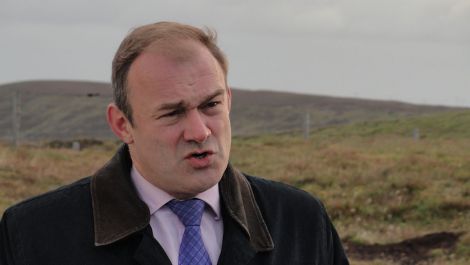News / ‘Freeing up the transmission charging logjam’
A RENEWABLE energy report published on Wednesday morning admits that the Scottish islands need a different charging system for transmitting green energy in order to compete with mainland producers.
And it suggests that more than 10,000 jobs could be created by 2030 – 2,900 in Shetland, 4,500 in Orkney and 3,500 in the western isles.
The Scottish Islands Renewables Project was set up by energy secretary Ed Davey in autumn last year after having visited Shetland.
He had been heavily lobbied by renewables developers from all Scottish islands who have been claiming for many years that they were discriminated against by high transmission charges.
The report shows that onshore wind, wave and tidal energy from the Scottish islands could make a significant contribution to the UK’s 2020 renewables targets if a suitable charging system is introduced.
Northern isles MP Alistair Carmichael said the findings vindicated local developers who had argued that the present system will not do.
“Having established that there is a case for island communities to be given a different charging system the next step now is to continue in our engagement with government to set up that system and to enable the development of renewable energy.
“This report also shows the potential for thousands of full-time jobs being created due to renewable developments. Locally, the economic implications could be huge.”
“This report is not the end of the story, but it is a possibly the most significant step towards freeing up the transmission charging logjam,” Carmichael said.
The energy secretary said: “The government is keen to unlock the potential for the development for renewable energy on the Scottish Islands, but it’s vital that projects represent value for money for the consumer.
“The report being published marks a considerable step in progress towards making decisions about supporting renewables investment on the Scottish islands.
Become a member of Shetland News
Scottish energy minister Fergus Ewing described the report as a huge step forward.
Orkney’s MSP Liam McArthur said: “This is a valuable piece of work, vividly highlighting the potential for Orkney to be a world leader in wave and tidal energy.
“It also sets out clearly the obstacles that need to be overcome if we are to ensure our islands play their full part in helping create a renewables revolution in this country.”
His Shetland colleague Tavish Scott added: ““Last week a renewable project in Yell got the go ahead. Shetland needs a fair transmission charging regime.
“This report can help and the UK energy secretary Ed Davey deserves credit for forcing the pace on this very important issue for the islands.
“We need government to now work on a practical mechanism which can support the development of renewable energy production in Shetland.”
Environmental pressure group WWF Scotland also welcomed the findings.
“It would be a great pity indeed if we were unable to take full advantage of the huge wind, wave and tidal power resource to be found on Scotland’s islands.
“This report makes clear the importance island renewables could play in meeting our climate and renewables targets.
“We urge the UK and Scottish governments to work together with relevant agencies to quickly find the most cost effective ways forward that enable us to harness more of the clean energy on Scottish islands,” its director Lang Banks said.
The report can be downloaded here.
Become a member of Shetland News
Shetland News is asking its many readers to consider paying for membership to get additional features and services: -
- Remove non-local ads;
- Bookmark posts to read later;
- Exclusive curated weekly newsletter;
- Hide membership messages;
- Comments open for discussion.
If you appreciate what we do and feel strongly about impartial local journalism, then please become a member of Shetland News by either making a single payment, or setting up a monthly, quarterly or yearly subscription.



























































